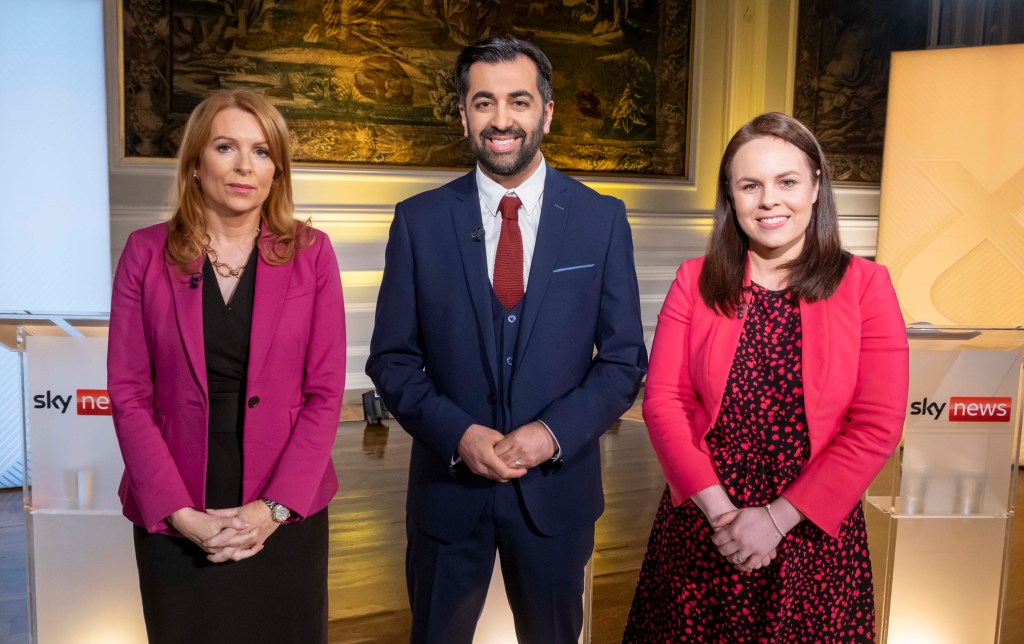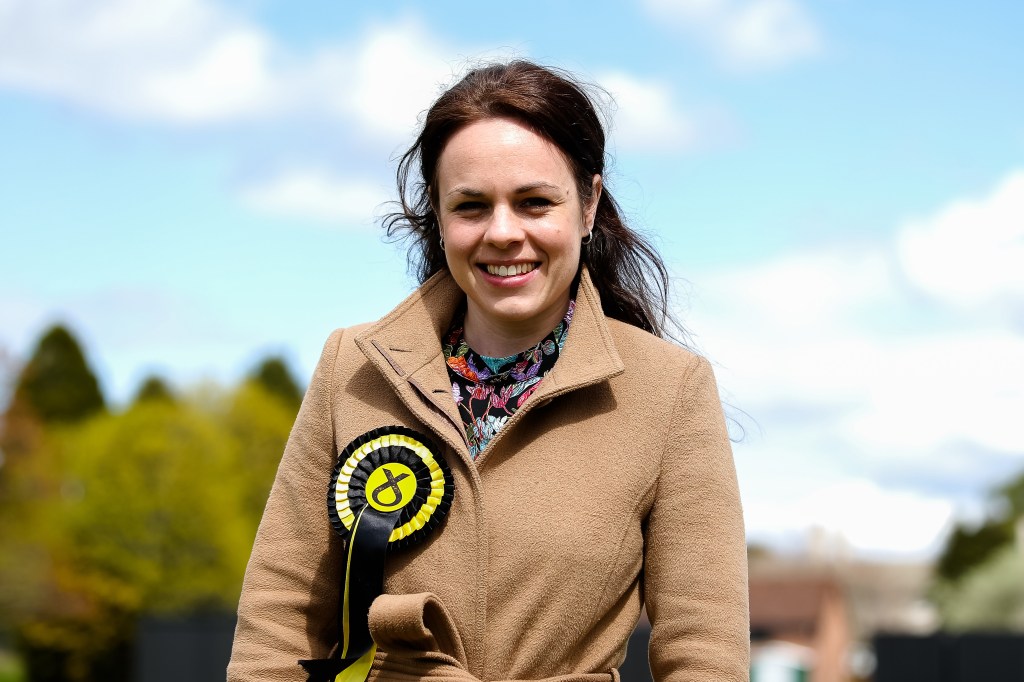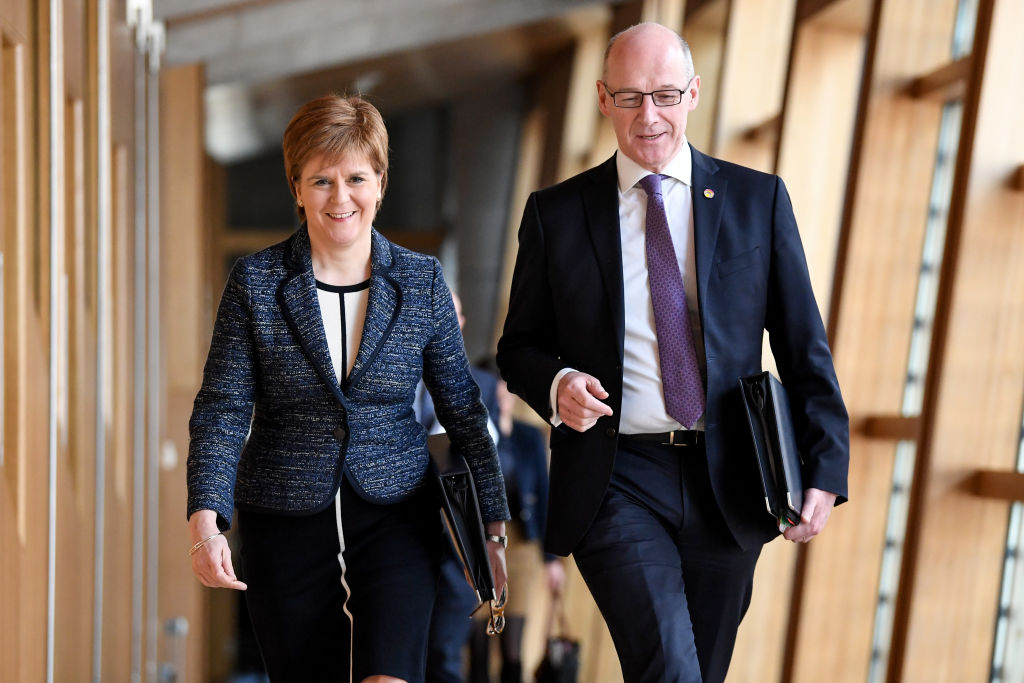Who will replace Humza Yousaf as First Minister and what does it mean for LGBTQ+ rights in Scotland?

One of the names tipped to potentially replace Humza Yousaf is Kate Forbes, but her LGBTQ+ views have been labelled as concerning by some people (Ken Jack/Russell Cheyne – Pool/Canva/Getty Images)
One of the names tipped to potentially replace Humza Yousaf is Kate Forbes, but her LGBTQ+ views have been labelled as concerning by some people (Ken Jack/Russell Cheyne - Pool/Canva/Getty Images)
Humza Yousaf dramatically quit as Scotland’s First Minister today (29 April), leaving many people in Scotland and beyond asking: who will replace him?
Yousaf announced he would step down from the role after he faced pressure following the collapse of the party’s power-sharing deal with the Scottish Greens – the Bute House Agreement.
Following Yousaf’s resignation, the decision of who will replace him will be down to members of Scottish Parliament (MSPs) at Holyrood, who have 28 days to choose a replacement. If MSPs are unable to pick a new leader then an election will be called.
Humza Yousaf succeeded Nicola Sturgeon and has been in the post of First Minister since March 2023 when he beat out Kate Forbes and Ash Regan, the latter of which defected to the Alba Party in the autumn. Here are two of the frontrunners being tipped as a possible replacement, and their stance on LGBTQ+ rights.
Kate Forbes
Former SNP finance secretary Kate Forbes is one early favourite to replace Humza Yousaf following his resignation, but her track record on LGBTQ+ rights poses concern for the community largely due to her views on same-sex marriage, trans rights and abortion.

When Forbes, who has been the MSP for Skye, Lochaber and Badenoch since 2016, announced her campaign for first minister back in February 2023 she was considered the frontrunner for the job. However, on the same day as launching her campaign she made some comments about equal marriage, which resulted in many of her backers withdrawing their support.
She told The Scotsman and Channel 4 News that had she been a politician at the time the legislation was being voted on she would not have supported equal marriage as a “matter of conscience”.
The MSP is an evangelical Christian and a member of the Free Church of Scotland, which has vocally opposed same-sex marriage, abortion and a ban on conversion therapy.
“I think for me, Angela Merkel is the example I would follow, I would have voted, as a matter of conscience, along the lines of mainstream teaching in most major religions that marriage is between a man and a woman,” she said.
“But I would have respected and defended the democratic choice that was made. It is legal right now and I am a servant of democracy, I am not a dictator.”
In a follow up interview with BBC Radio’s Good Morning Scotland Forbes insisted she would “defend to the hilt everybody’s rights in a pluralistic and tolerant society, to live and to live free of harassment and fear”.
Back in 2019, Forbes was also one of 15 SNP politicians who signed a letter against Scotland’s proposed Gender Recognition Act (GRA) reforms.
Forbes said reforming the GRA “risked creating bad law”, echoing the words of the letter which stated “conflating sex with gender identification affects a wide range of policy and service delivery, including data collection education, health and social care, justice and sport”.
She has also expressed “significant concerns” about self-ID.

Alongside LGBTQ+ issues, Forbes has also spoken out against abortion.
Back in 2018 Forbes addressed attendees at a religious event where she delivered a “prayer for the nation”.
“May our politicians recognise that the way we treat the most vulnerable – whether the unborn or the terminally ill – is a measure of true progress,” she said.
In the past, LGBTQ+ politicians and activists have spoken out against Forbes views.
Scottish Greens member and activist Heather Herbert previously described Forbes as a “disaster” for queer folks in Scotland due to her personal beliefs.
Moray MSP Richard Lochhead who expressed support for Forbes 2023 campaign prior to her comments on equal marriage revoked his support after her comment and said the SNP cannot have “a Party Leader who’d vote against same sex marriage”.
Killian Riley, who’s a gay Scottish National Party activist, told PinkNews last year he had been left “shocked” and “disappointed” by Forbes comments.
“[Her words] make me feel hurt, they are a stark reminder that there is still a decent chunk of our society that doesn’t see my relationship with my partner as equal to that of a straight couple,” he said.
“You know that people do think that, but you often forget that they’re throughout society, not just on the fringes. It stings.”
John Swinney

John Swinney is, potentially, seen by many as a safe, steady pair of hands to replace Humza Yousaf.
The 60-year-old former SNP leader was Sturgeon’s trusted deputy First Minister. According to The National, many senior SNP figures are backing Swinney to succeed Yousaf.
Speaking to the BBC, the SNP’s former Westminster leader Ian Blackford said that Swinney “has what it takes” to lead the SNP. “He certainly is an individual that I believe carries widespread respect in the party across the Parliament, and indeed the country, a long experience,” he said.
Swinney addressed rumours that he could replace Yousaf at an event in London on Monday morning (29 April). Before Yousaf resigned, Swinney was asked whether he wanted to be First Minister, replying: “It’s a hypothetical question.”
He also added that the job is a very “demanding role” and that “it takes a lot of thinking about”.
John Swinney previously locked horns with Kate Forbes, questioning whether her stance on gay marriage made her “appropriate” to be the leader of the SNP, after Forbes made it clear that she would not have voted for gay marriage if she had been an MSP in 2014.
Swinney said: “I’m a man of deep Christian faith but I do not hold the same views. Kate is perfectly entitled to express her views, but party members are equally entitled to decide if someone who holds those views would be an appropriate individual to be SNP leader and First Minister.”

